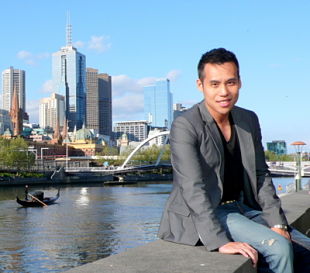
THE STORY is quite familiar.
A hard-working Chinese family saves throughout the stagnant 70s and eye-opening 80s to send their cherished offspring overseas to get a coveted Western higher education in the roaring 90s.
And although PRC students are still flooding the best US schools with their brightest offerings, they are now often rushing back to a booming China just after graduation, even as their mortarboards are still sailing through the air.
In this latest installment featuring young professionals, we meet 30-something Shanghai native and PR executive Mr. Johnny Wang.

NextInsight: What prompted your parents to move with you to the US a decade ago, and what brings you back to China today?
Mr. Johnny Wang: We moved to the US 14 years ago because my parents wanted me to pursue higher education there. After I received my BA, I worked for an investment bank on Wall Street for close to three years before returning to China.
When I left New York, the US economy was in the middle of the financial crisis and Asia, though impacted, still offered many exciting opportunities. I have always wanted to establish my career in China so it was optimal timing to return at that time.
You graduated from Wharton, a business school familiar to quite likely 99% of our finance-savvy readership. Would you say that the knowledge you learned there was most beneficial to career advancement in China, or was it the connections you made there?
Mr. Wang: It’s both. China’s capital markets are in the beginning development stage and many financial instruments and concepts are foreign to domestic investors and wealthy individuals. Chinese citizens are also learning quickly and becoming sophisticated investors as a result of globalization.
The knowledge and information I learned from Wharton definitely provided me with a strong foundation to navigate and familiarize myself with the capital markets in China, and the connections I built are helping me to expand my network. A US education combined with a similar culture background has been advantageous for me since I moved back to China.
Many people reading this article would likely dream of getting an MBA from Wharton. How well does it prepare you for a career in China, and how close are the business links between Wharton and the PRC?
Mr. Wang: Wharton has a large population in both the undergraduate and MBA programs. Leadership and entrepreneurship are two strong points of focus and elements during our stay at Wharton. I believe they are important transferable skills that will benefit me for a career anywhere. There is also a large Wharton alumni group in China for new graduates and expatriates to connect and network. The world of business is global, so you will find links everywhere.

You very often come to Shenzhen on business. Primarily for what reason?
Mr. Wang: To visit my clients and attend their business functions. In addition, I also visit prospective clients with my colleagues and often superiors.
How would you compare the entrepreneurial spirit in Shenzhen today vs. Shanghai? UPenn? New York City?
Mr. Wang: Shenzhen is one of the most active cities in China in terms of entrepreneurship. I remember all the inspired entrepreneurs wanted to go to Shenzhen to start their business when I was young. Today, Shenzhen is one of the most developed and international cities in China. Compared to Shanghai, it has a sense of origin since it was the starting point of the entrepreneurial spirit. It is certainly more similar to some of the busiest and most active cities in the US such as New York.
What do you feel is the best thing about investing in Shenzhen-based firms/Shenzhen-listed firms? And what is the least wonderful thing about investing in Shenzhen-based firms/Shenzhen-listed firms?
Mr. Wang: The best thing about Shenzhen-listed companies is that the management is more sophisticated and the operations are more standardized. Since the city has been developing from a very early stage and the local economy has flourished, the local residents are more open-minded and welcoming to foreign methods and concepts.
The least wonderful thing about investing in Shenzhen companies is the difficulty of finding new, innovative and fast growing corporations. Investors are more likely to find a fast growing company in other provinces and cities than in Shenzhen with the same amount of time.

Many people compare Shanghai to Shenzhen rather than Shanghai to Beijing because Shanghai and Shenzhen have the country's only two A-share markets, possess the two biggest container shipping ports and are home to the two biggest greater metro industrial developments in all of the PRC. Do you think the two cities have more in common than do Shanghai and Beijing, and can you elaborate?
Mr. Wang: I do see more similarities between Shenzhen and Shanghai than Beijing and Shanghai, mainly from the mix of local populations and level of economic development. The fundamental elements and attractions of Shenzhen and Shanghai are very similar, while Beijing has a more historical, cultural and political spin to it.
What areas have you felt increased in cost the most since you first started visiting Shenzhen: Rent, food, transportation, wages or entertainment? Why do you think that is and what have you done to cope with this pressure?
Mr. Wang: I believe the increase in property prices is the biggest challenge and local residents should take advantage of the government benefits in terms of discounted housing for families with difficulties. Watching spending and saving habits are the most practical solutions I can think of.
What advice do you have for someone, especially a foreign passport holder like yourself, looking to set up a business here?
Mr. Wang: The most important thing is to do thorough research on the location, local market for the product or service and relevant regulations. Chinese consumers can be very different than in other countries although the local regulations and policies can be difficult to navigate at times.
Mr. Wang can be reached at:
See these recent stories on Shenzhen professionals:
Youth Not Always Wasted On The Young
'Easy To Start Business, Hard To Find People You Can Trust'
Young Woman Learns It Takes More Than Two To Tango
Briton Walking On The Wild Side







